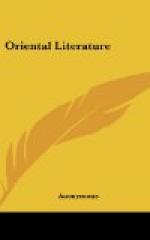Lebid Ben Rabiat Alamary.
[1] The author of this poem was a native of
Yemen. He was contemporary
with Mohammed and was
already celebrated as a poet when the prophet
began to promulgate
his doctrines. Lebid embraced Islamism and was
one of the most aggressive
helpers in its establishment. He fixed
his abode in the city
of Cufa, where he died at a very advanced age.
This elegy, as is evident,
was written previous to Lebid’s conversion
to Islamism. Its
subject is one that must be ever interesting to
the feeling mind—the
return of a person after a long absence to
the place of his birth—in
fact it is the Arabian “Deserted Village.”
THE TOMB OF MANO
Friends of my heart, who share my sighs!
Go seek the turf where Mano lies,
And woo the dewy clouds of spring,
To sweep it with prolific wing.
Within that cell, beneath that heap,
Friendship and Truth and Honor sleep,
Beneficence, that used to clasp
The world within her ample grasp.
There rests entomb’d—of
thought bereft—
For were one conscious atom left
New bliss, new kindness to display,
’Twould burst the grave, and seek
the day.
But tho’ in dust thy relics lie,
Thy virtues, Mano, ne’er shall die;
Tho’ Nile’s full stream be
seen no more,
That spread his waves from shore to shore,
Still in the verdure of the plain
His vivifying smiles remain.
Hassan Alasady.
TOMB OF SAYID[2]
Blest are the tenants of the tomb!
With envy I their lot survey!
For Sayid shares the solemn gloom,
And mingles with their mouldering
clay.
Dear youth! I’m doom’d
thy loss to mourn
When gathering ills around
combine;
And whither now shall Malec turn,
Where look for any help but
thine?
At this dread moment when the foe
My life with rage insatiate
seeks,
In vain I strive to ward the blow,
My buckler falls, my sabre
breaks.
Upon thy grassy tomb I knelt,
And sought from pain a short
relief—
Th’ attempt was vain—I
only felt
Intenser pangs and livelier
grief.
The bud of woe no more represt,
Fed by the tears that drench’d
it there,
Shot forth and fill’d my laboring
breast
Soon to expand and shed despair.
But tho’ of Sayid I’m bereft,
From whom the stream of bounty
came,
Sayid a nobler meed has left—
Th’ exhaustless heritage
of fame.
Tho’ mute the lips on which I hung,
Their silence speaks more
loud to me
Than any voice from mortal tongue,
“What Sayid was let
Malec be.”
Abd Almalec Alharithy.




